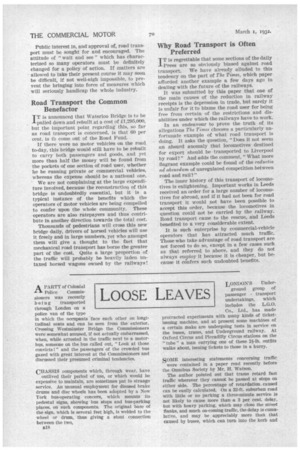Why Road Transport is Often Preferred
Page 36

If you've noticed an error in this article please click here to report it so we can fix it.
TT is regrettable that some sections of the daily -I-Press are so obviously biased against road transport. We have already alluded to this tendency on the part of The Times, which paper afforded another example a few days ago. in dealing with the future of the railways.
It was submitted by this paper that one of the main causes of the reduction in railway receipts is the depression in trade, but surely it Is unfair for it to blame the road user for being free from certain of the restrictions and disabilities under which the railways have to work.
In an endeavour to prove the truth of its allegations The Times chooses a particularly unfortunate example of what road transport is doing. It asks the question, "Does it not seem an absurd anomaly that locomotives destined for export should be transported to Liverpool by road?" And adds the comment, "What more flagrant example could be found of the redurtio ad absurdum of unregulated competition between road and rail?"
The inner history of this transport of locomotives is enlightening. Important works in Leeds received an order for a large number of locomotives for abroad, and if it had not been for road transport it would not have been possible to accept this order, because the locomotives in question could not be carried by the railway. Road transport came to the rescue, a-nd Leeds benefited to a very considerable extent.
It is such 'enterprise by commercial-vehicle operators that has attracted much traffic. Those who take advantage of road transport are not forced to do so, except in a few cases such as that referred to above, and they do not always employ it because it is cheaper, but because it cOnfers such undoubted benefits.




































































































